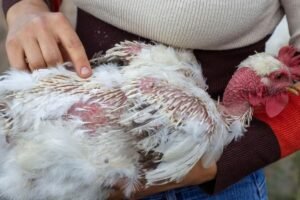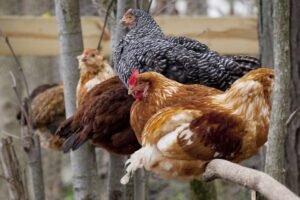If you have chickens, you have flies. It’s an unavoidable part of backyard poultry keeping. But are these buzzing pests just an annoyance, or do they pose a real threat to your flock’s health? The truth is, while a few flies are harmless, a fly infestation is a serious problem. In this guide, we’ll cover the dangers flies present, from disease to the dreaded fly strike, and give you a complete battle plan for prevention, natural repellents, and effective traps.
In a Hurry? Here’s the Bottom Line:
- Are flies dangerous? Yes, they spread diseases like Salmonella and can cause a fatal condition called fly strike.
- Prevention is Key: The #1 way to control flies is through relentless coop cleanliness and moisture management.
- Natural Solutions Work: Use herbs, vinegar sprays, food-grade Diatomaceous Earth, and safe agricultural lime to repel flies.
- Fly Strike is an Emergency: If you see maggots on your chicken, it is a medical emergency. Isolate the hen and call a veterinarian immediately.
The Hidden Dangers: Why Flies Are More Than Just a Nuisance
Flies are not just annoying; they are vectors for disease and stress. They spend their time feasting on manure and garbage before landing on your chickens’ food and water, creating a perfect opportunity to spread harmful pathogens.
- Disease Transmission: Flies are well-documented carriers of bacteria. A single housefly can carry millions of microorganisms on its body, including those that cause serious illnesses in both chickens and humans. They can easily contaminate your flock’s food and water with bacteria like Salmonella and E. coli, which can lead to severe diarrhea, lethargy, and a drop in egg production.
- Stress and Irritation: A constantly buzzing flock is a stressed flock. Swarms of flies can cause hens to become agitated, leading to reduced egg-laying and a weaker immune system that makes them more susceptible to other ailments. In my own coop, I’ve seen stressed hens become more prone to feather picking and aggressive behavior.
- The Threat of Fly Strike: The most severe danger is Myiasis, commonly known as fly strike. This happens when flies, particularly blowflies, lay eggs on a chicken, often near the vent or in an open wound. The eggs hatch into a writhing mass of maggots that feed on the chicken’s living flesh, causing immense pain and potentially leading to a fatal infection.
Can Chickens Get Sick from Eating Flies?
Yes, while chickens enjoy eating flies as a natural source of protein, there is a small risk. The flies themselves are generally not the problem, but if they have recently landed on contaminated material, they can transfer bacteria to your chicken. The much greater danger is from flies contaminating the coop environment. It’s also a definite no to let chickens eat flies from traps, as they may contain poison or be full of bacteria.
The dangers are real, but the good news is that with the right knowledge, you can tackle the problem at its source. Understanding what attracts flies is the first step in winning the battle for a fly-free coop.
Know Your Enemy: Why Your Coop is a Fly Paradise
To control a fly problem, you have to understand why flies are attracted to your coop in the first place. A chicken coop provides everything a fly needs to thrive: food, moisture, and a place to lay its eggs.
The “Big Three” Attractants:
- Manure: This is the number one reason flies gather in your coop. It’s not just food for them; it’s their primary breeding ground. A female fly can lay hundreds of eggs in a few days in manure.
- Moisture: Spilled water from leaky drinkers, damp bedding, and high humidity create the perfect environment for flies to lay eggs. Flies are also attracted to the moisture in your chickens’ droppings.
- Food: Spilled feed and kitchen scraps are a buffet for flies and can also attract rodents. This is especially true for fermenting fruits or vegetables.
Understanding the Fly Life Cycle
The key to getting rid of flies in your chicken coop naturally is to break their life cycle. A fly goes through four stages: egg -> larva (maggot) -> pupa -> adult fly. A female fly can lay hundreds of eggs in a few days. If you can stop the eggs from hatching and the maggots from maturing, you’ll be able to control the fly population. This is why sanitation is far more effective than simply swatting adult flies.
Understanding why your coop is a fly magnet is half the battle. Now, let’s get into the specifics of how to transform your coop from a fly paradise into a fly-free fortress.
The 4-Pronged Attack: How to Get Rid of Flies in the Chicken Coop
Fly control requires a comprehensive approach. Here is a battle plan to attack the problem from all sides.
Prong 1: Coop Management – Your First Line of Defense
This is the most critical step. If you don’t control the environment, you’ll always be fighting a losing battle.
- Coop Hygiene and Manure Management: You have two main options for managing manure:
- Regular Clean-outs: A light “poop scoop” daily or every other day is a simple but effective habit. A full bedding change should be done weekly in warmer weather.
- The Deep Litter Method: You add a fresh layer of carbon-rich bedding (pine shavings, shredded leaves) every few days and turn the bedding weekly. This method encourages beneficial microbes to break down waste.
- Choosing the Right Bedding: The bedding you use can make a huge difference. Sand is an excellent option because it dries out manure quickly, making it a less-than-ideal breeding ground for flies. It’s also easy to sift and clean. Pine shavings are also a popular choice, but they must be kept dry.
- Moisture Control: Ensure your waterers aren’t leaking and are placed in a spot where spills can be easily cleaned up. Consider switching to a nipple or cup waterer to prevent spillage. Good ventilation in the coop is essential to keep the air moving and the bedding dry.
- Feed Storage: Store all feed and supplements in sealed, rodent-proof containers. Don’t leave spilled feed on the ground. Use a hanging or treadle feeder that minimizes waste.
Prong 2: Natural and DIY Fly Repellents
Harness the power of natural substances to make your coop a less appealing place for flies.
- Herbal Power: Flies hate the smell of many herbs. You can hang bunches of fly-repelling herbs like mint, basil, and lavender in the coop. Placing these herbs in your chickens’ nesting boxes also helps keep the area smelling fresh. Chickens can eat these herbs, and it’s a healthy treat.
- Does Vinegar Repel Flies? Yes! Apple cider vinegar can be used as a cleaning agent to neutralize odors. To make a simple spray, mix equal parts white vinegar and water. The smell of vinegar also deters flies.
- Homemade Fly Spray for Your Chicken Coop: A simple and safe homemade spray can work wonders. In a spray bottle, mix 1 cup of water, 1 cup of apple cider vinegar, and a few drops of vanilla extract or a safe essential oil like peppermint. Spray this mixture on coop surfaces, but avoid spraying it directly on your chickens. A common mistake chicken keepers make is using too much essential oil, which can harm a chicken’s delicate respiratory system.
- Is Cinnamon Safe for Chickens? Yes, cinnamon is safe for chickens and can be added to their dust bath or feed. While not a primary fly repellent, it can help to deter some pests and adds a pleasant scent.
Prong 3: The Power of Powders – DE and Lime
Powders can help manage moisture and deter pests, but it’s crucial to use the right type.
- Using Diatomaceous Earth (DE) for Flies: Diatomaceous Earth (DE) is a natural powder made from the fossilized remains of diatoms. It works by absorbing fats and oils from the exoskeletons of insects, causing them to dehydrate. Crucially, you must use food-grade DE, which is safe for poultry. When applying it, wear a mask to protect your respiratory system.
- Does Lime Help with Flies? (And Is It Safe?) This is a critical safety point. There are two types of lime: agricultural/garden lime (calcium carbonate) is safe and can be used to help dry out manure and reduce odor. Hydrated lime (calcium hydroxide), however, is highly alkaline and DANGEROUS for chickens. It can cause severe chemical burns to their feet and respiratory damage if inhaled. Never use hydrated lime in your coop.
- Other Powder Options: Another popular option is Sweet PDZ, a non-toxic mineral that absorbs ammonia and moisture, reducing odors that attract flies.
Prong 4: Trapping Flies – Reducing the Adult Population
While prevention is key, trapping can help reduce the adult fly population and provide immediate relief.
- Best Fly Traps for the Chicken Coop: Sticky fly tape is a great option. Hang it high in the coop where chickens can’t reach it. Disposable fly bait traps are also very effective, but because of their strong, foul odor, they should be hung well outside the coop.
- DIY Bottle Traps: You can make your own simple bottle traps. Cut the top third off a plastic bottle, invert it to create a funnel, and place a bait mixture in the bottom (e.g., sugar water, a piece of fruit, or apple cider vinegar).
- Using Beneficial Insects: Consider releasing fly predators into your coop. These are tiny, non-stinging wasps that prey on fly larvae, effectively breaking the fly life cycle before it begins.
Now that you have a complete plan to prevent and repel flies, let’s address the most serious fly-related threat: fly strike. Knowing how to identify and act on this emergency is a crucial part of any chicken keeper’s knowledge.
All About Fly Strike: Prevention, Identification, and Action
Fly strike is a terrifying and life-threatening condition. Knowing how to prevent it and what to do is critical for any chicken keeper.
What is Fly Strike (Myiasis)?
Fly strike is the most severe condition caused by flies. It occurs when a fly lays eggs on a hen, usually in a soiled area around the vent or an open wound. The eggs hatch into larvae (maggots) that then begin to feed on the chicken’s living flesh.
How to Prevent Fly Strike
Prevention is your best defense. A clean coop and a clean flock are essential. Regularly check your chickens for “poopy butt,” and if a hen is particularly messy, gently wash her vent area.
Signs of Fly Strike and What to Do
Fly strike is a medical emergency. You may notice your chicken is lethargic, isolated, has a foul odor, or you may see the maggots themselves.
If you suspect fly strike, take immediate action:
- Isolate the hen from the rest of the flock.
- Gently wash the area with warm water to remove as many maggots as possible. You can use tweezers to carefully remove any stubborn ones. A veterinarian will have specific products to help with this.
- Pat the area dry and apply a non-stinging antiseptic spray.
- CALL A VETERINARIAN IMMEDIATELY. This is not a problem you can solve alone. A vet can provide antibiotics and proper wound care.
Can a Chicken Survive a Fly Strike?
Yes, a chicken can survive a fly strike with prompt and proper treatment, but it is a life-threatening condition. Early detection and immediate action are absolutely key.
Fly strike is a serious concern, but by being proactive and vigilant, you can protect your flock from this painful condition. For any lingering questions, this final section has you covered.
Frequently Asked Questions (FAQ)
Q1: What about the small black flies in my chicken coop?
A: These are likely fungus gnats or fruit flies, which are attracted to dampness and fermenting matter. The same cleaning and drying principles apply. Focus on removing wet bedding and spilled feed.
Q2: My neighbor’s chickens are causing a fly problem at my house. What can I do?
A: The best first step is a friendly conversation. They may not be aware of the problem. You can share some of the tips from this article. If the problem persists, you can check local ordinances.
Q3: How do I prevent flies from hatching in the first place?
A: The key is manure management. Flies must have a moist, organic place to lay their eggs. Remove wet manure and bedding regularly to break the life cycle at the source.
Q4: What’s the best way to clean a chicken coop to prevent flies?
A: A thorough cleaning is essential. First, remove all bedding. Second, scrape down roosts and surfaces. Third, scrub with a solution of water and vinegar. Fourth, let the coop dry completely before adding fresh, dry bedding.
Q5: Can chickens eat maggots?
A: Yes, chickens love eating maggots and they are a great source of protein. In fact, some chicken keepers deliberately farm maggots (from non-toxic sources) as a treat for their flock. The danger comes only from maggots on a chicken’s body (fly strike) or from a poisonous source.
Q6: Are there any commercial products I can use?
A: Yes, there are several commercial products available. These include fly bait stations, fly baits (which contain insecticides), and premise sprays. However, it’s crucial to read labels carefully and only use products that are explicitly labeled as safe for use in or around poultry. Always follow the manufacturer’s instructions.
Conclusion: A Clean Coop is a Happy, Fly-Free Coop
Flies are more than just a nuisance; they are a health risk to your flock, but they are completely manageable. By making prevention through cleanliness a regular part of your routine, you can protect your chickens from disease and fly strike and ensure they live in a healthier, more peaceful environment.

Oladepo Babatunde is the founder of ChickenStarter.com. He is a backyard chicken keeper and educator who specializes in helping beginners raise healthy flocks, particularly in warm climates. His expertise comes from years of hands-on experience building coops, treating common chicken ailments, and solving flock management issues. His own happy hens are a testament to his methods, laying 25-30 eggs weekly.



